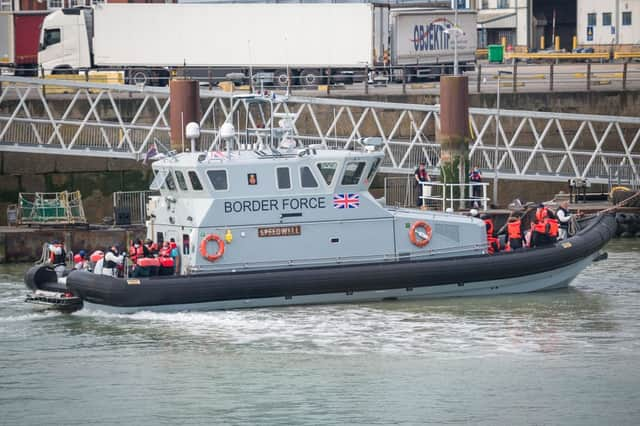Here’s why migrants risk their lives to come to the UK


Thousands of migrants attempt to make the crossing over the English Channel in dinghies and small boats every year.
Nearly 4,000 migrants have crossed the Channel so far this year, with more than 300 of these journeys made in small boats.
Advertisement
Hide AdAdvertisement
Hide AdBut why do people risk their lives to come to the UK? Here’s what you need to know.
How many migrants arrive in the UK each year?
Around 677,000 people moved to the UK as long-term migrants in 2019 for work or study, while there were 49,000 asylum applicants.
The number of people seeking asylum in the UK is much lower than in some other European countries, with 165,600 applying for refuge in Germany, 129,000 in France and 118,000 in Spain.
In 2020, almost 4,000 people have crossed the English Channel to seek asylum in the UK, with a record number of at least 235 arrivals being recorded on 6 August, according to the BBC.
Advertisement
Hide AdAdvertisement
Hide AdDespite thousands of migrants attempting the crossing each year, some boats are intercepted by the French authorities before they reach British waters. Under international maritime law, anyone whose life is in danger at sea must be rescued.
The boats that are picked up are typically small dinghies that are overcrowded with passengers, often with children on board.
Many lives are lost making the journey across the English channel, as it is one of the busiest and most dangerous shipping lanes in the world.
Where do the migrants travel from?
Migrants that travel to the UK typically come from some of the poorest countries in the world, usually from regions to the south and east of Europe, including the Greater Middle East and Africa.
Advertisement
Hide AdAdvertisement
Hide AdOnce they are picked up by the UK authorities, many ask to claim asylum.
To be eligible for asylum, people must have left their country and be unable to return because of fear of persecution.
Migrants are usually taken to short-term holding centres by the UK Border Force after being picked up from crossing the Channel.
Those seeking asylum who have no money may be placed in accommodation anywhere in the UK. This is paid for by the Home Office while their asylum application is considered.
Advertisement
Hide AdAdvertisement
Hide AdWhy do migrants come to the UK?
There are many different reasons people choose to risk their lives to reach the UK, with motivations typically classified into four main categories:
- Work
- Study
- Family
- Asylum or refugee resettlement
It is hard to apply for asylum in the UK unless you are already in the country, which is why many choose to make the dangerous journey across the Channel.
Under a long-standing European Union deal, called "Dublin III", the UK has the right to send back anyone who is seeking asylum if they could have reasonably claimed it in another country along the way.
However, this arrangement will come to an end in January, once the Brexit transition period has finished, unless a similar agreement is struck.
Advertisement
Hide AdAdvertisement
Hide AdOther arrivals may have a stronger case to apply for asylum in the UK if they already have relatives who live here.
Those who have no real claim for refuge are usually seeking to work in the UK without applying for a visa first, as they believe it is better than staying in their homeland.
Is the government working to stop people from crossing?
Home Secretary Priti Patel has said that the UK is seeking more cooperation from the French authorities to intercept boats, and to stop migrants leaving France to make the crossing altogether.
Ms Patel said: "The number of illegal small boat crossings we have seen recently is totally unacceptable.
"Our operational partners are dealing with complex challenges associated with them and collectively with the French we need to make this route unviable.